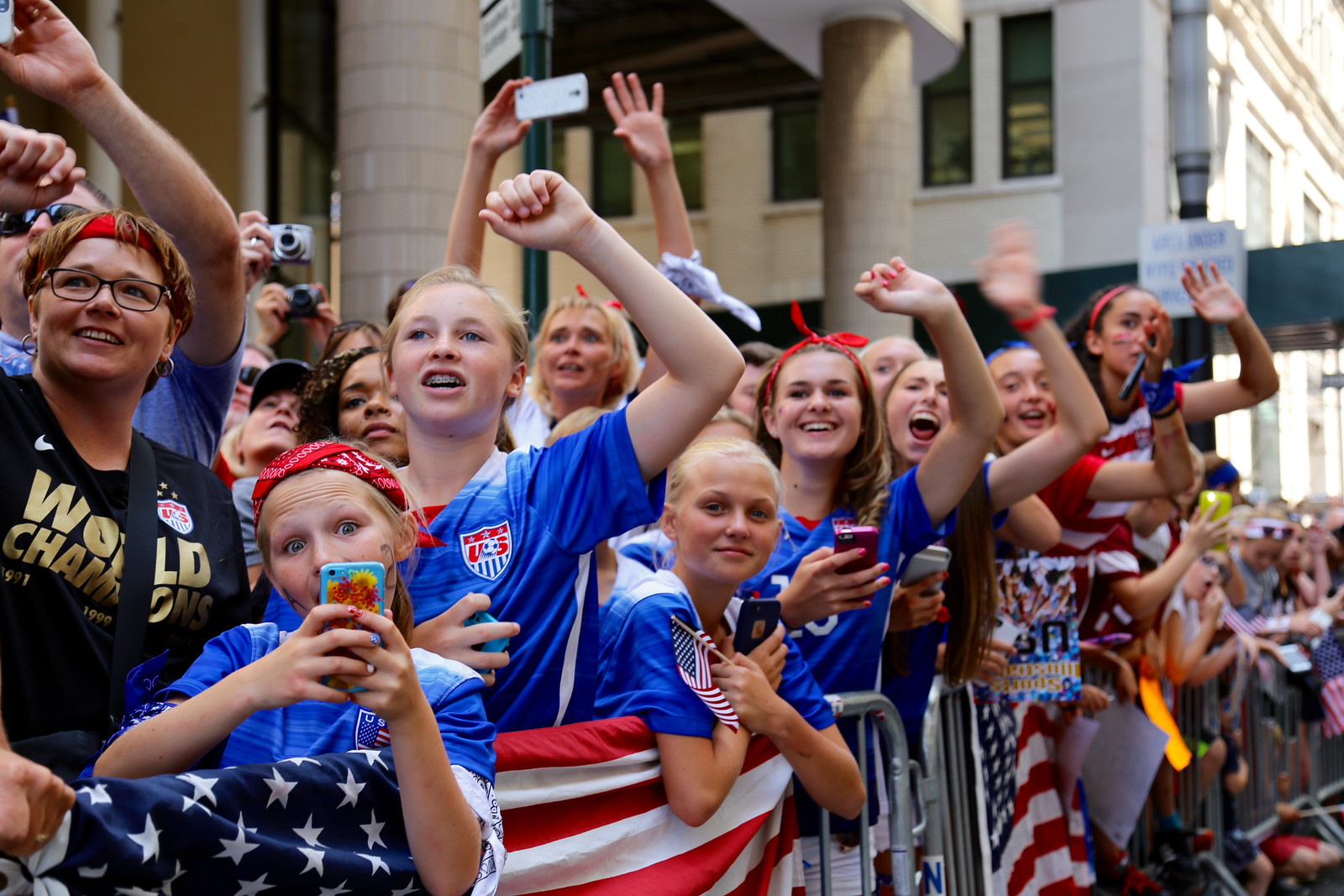The Feminist Files: Sexism in Sports
Columnist Keira Burns (right) and Isabella Ledesma at a Chicago Cubs game. Despite positive strides, female sports fans still face sexist comments and stereotypes.
October 22, 2019
“The Feminist Files” is a column which explores timely issues in politics, history, and culture from a feminist lens. Feminism is about equality for all genders, and this column will address issues related to gender equality, and the lack thereof, in today’s changing world.

As a kid, I always looked forward to watching college football on Saturdays with my family. Whenever Holly Rowe was reporting, my dad made an effort to remind me that girls could be sports reporters, and they could be knowledgeable and successful in the industry. It was so inspiring to see a woman in a job like hers, and to see women who shared my interests on a prominent stage.
As a cancer survivor, Rowe is the definition of strength. One would expect a sportscaster to take time off work during an intense treatment – but not Rowe. Not only did she receive chemotherapy while she worked during the college football season, but she attended chemotherapy sessions in the day and return to the field or court at night.
She isn’t my only mentor in sports journalism, of course. ESPN Baseball Analyst Jessica Mendoza is extremely qualified, experienced, and knowledgeable- so much so, in fact, that she earned jobs from both the New York Mets and ESPN. I cannot begin to describe how excited I was when I heard her voice while watching the Cubs, as it was so refreshing and exciting to hear.
Despite her talent, she still receives sexist criticism, largely from angry men on the internet. This isn’t unique to Mendoza; prominent female sportscasters like Erin Andrews, Rowe, and Maria Taylor have also received sexist criticism online, as people tend to question them more than their male colleagues. These women are extremely successful and knowledgeable and at the top of their field (no pun intended), but still are doubted by so many.
Having women represented in the sports industry is vital to combating gender expectations related to sports. I am lucky because my parents made a point to expose me to women in the industry (Holly Rowe, Notre Dame Women’s Basketball, the U.S. Women’s Hockey Team, etc) and brought me up surrounded by a family where everyone watches and bonds over sports.

Holly Rowe has covered sports for ESPN since 1988.
However, many parents expose their young kids to a sports culture that does not include women – where sports are considered to be more for boys than girls. Boys are often expected to be athletic and knowledgeable about sports simply because of their gender. This is just as unfair as the lack of expectation for women. There is no reason to hold boys accountable to knowing all there is to know about sports. Even when kids are young, boys are made fun of for not being “athletic enough” or not knowing about something sports-related. Not everyone is a sports fan, and that’s okay. What isn’t okay is when society holds different sports-related standards depending on one’s gender.
It’s vital to have more women represented in the sports industry, both in terms of female reporters and sports media coverage of women’s teams. Hopefully, girls will grow up seeing themselves in the sports world, and will be more comfortable and confident if they wish to enter it and boys will grow up knowing that the world of sports is not just for them, but for everybody.
There is also the other extreme – where people act overly impressed with female sportscasters “knowing their stuff.” Both female and male sportscasters “know their stuff”. That is why they have the job. The issue here is not that people are impressed – but that people are surprised – when a female sportscaster is knowledgeable and successful. The idea that these women are unusual, that a woman who knows about sports is an exception to the norm, is extremely concerning.
Female sports fans deal with similar issues. We’ve all been questioned by people who doubt our knowledge – just because of our gender. It’s 2019 and people like this need to grow up, realize that sports are not just for men, and learn how to be respectful. Maybe if they listened to a female sports fan or athlete, they could learn a thing or two. There really are more of us than people believe, and we are always hearing criticism. If someone makes a mistake, it turns into a rant about women not being “real fans.”
And if we say something knowledgeable, people are always surprised. Sometimes, we hear the classic “Are you a fan because of your dad?” Note that there’s absolutely nothing wrong with people influencing you to become a sports fan – but the issue lies in that women are expected to be fans because of someone else (usually a man), and not simply because of her own interest.
I’ve been a Cubs fan since before I can remember – since I was 2 years old, unable to pronounce the letter “c”, constantly shouting about the “Pubs.” I’m lucky that I frequently go to baseball games. My family often plan our vacations around catching games at various ballparks (We’ve been to 12 so far, so there’s 18 to go!). Some of my most treasured memories have taken place around watching sports with my family.
Still, girls and women who are sports fans like me aren’t always acknowledged or thought of as valid. However, guys just don’t get questioned about it. No one is ever shocked when a guy says he is a big sports fan. They generally assume he knows what he is talking about, while people act impressed but surprised when a girl does the same. Personally, I have dealt with this on numerous occasions – and I’m sick of it.
Freshman and diehard Cubs fan Abby Knipfer has a similar story. She grew up watching baseball and has always been a Cubs fan. It has been passed down through her family through generations, with her mom “passing [it] on to [her] and raising [her] as a Cubs fan”.
However, this isn’t enough for everyone to view her as a valid fan. Knipfer said that “On a consistent basis, men question my knowledge of the sport, and try to challenge it. It is frustrating as a female sports fan to have people trying to make you feel like you know nothing about a team or sport you have been raised on for 15 years.”
When I was little, I played games with my cousins all the time. We would sometimes play a game called “shinny hockey,” which involved stacks of couch cushions and pillows in a circle surrounding our “rink.” We would push and shove each other, and I would swing my mini stick as hard as my 8-year old self could. I never once felt like I was doing something unusual for my gender.
And I was right.
There is absolutely no reason little girls cannot play the same games as little boys. Society has created a gender divide between “normal” activities for kids – starting from the time they are very young. This may be one of the most influential factors in the sexism surrounding sports in the world. Additionally, it was totally expected for the boys to play games like this. There is no reason to put expectations on young boys to play sports just because of their gender.
There was a similar event one day in my middle school gym class. We were going to play flag football, but they let all the boys go outside and kept the girls inside. We all had to sit down on the floor as the teachers told us how to play flag football. I’m fairly certain many middle schoolers know enough to play flag football, but it was assumed that we would not just because we were girls.
It’s extremely important to note that these gender norms can be harmful to boys as well.

Hints of sexism in the sports industry go beyond fans and reporters- athletes deal with it too. The extremely talented U.S. Women’s soccer team is a prime example. They have been incredibly successful since the Women’s World Cup officially started in 1991. In the 8 tournaments since, the women have won first place four times. In the other four tournaments, they placed second or third. The men’s tournament has occurred 21 times, with the men’s team peaking in 1930 soley earning a third place once- in 1930.
However, these hardworking, athletic, amazing women are paid less than the men. As explained by ESPN, in each of the 20 regular season games, the women would earn an average of $4,950, while the men would earn an average of $13,966.
While it cannot be ignored that that the women’s world cup may generate less profit and have a shorter history, none of these serve as excuses to underpay these phenomenal, talented, strong women playing on the field.
Additionally, women’s college basketball gets very little credit compared to men’s. Every year, I participate in the ESPN bracket challenge for both tournaments, but very few people do both. The website shows the men’s tournament as the “Bracket Challenge” and the women’s as the “Women’s Bracket Challenge” as opposed to labeling them as “Men’s Bracket Challenge” and “Women’s Bracket Challenge” respectively. While this may seem like a petty or trivial issue, it would be a very easy change to make to show support for the women’s tournament.
The argument that the women’s tournament may have fewer fans is flawed. This is because it could be questioned which came first. Because of the lack of media attention, people don’t feel compelled to watch it or keep track of the teams. But when there is less fan attention, outlets like ESPN are going to focus on the men’s tournament. It is a vicious cycle that continues to push women’s sports down, and sometimes is only acknowledged by ESPN’s scrolling headlines along the bottom of the screen.
Despite popular belief, there’s no shortage of excitement in the women’s tournament. In March of 2018, National Champion Notre Dame’s consistently dominant team gained some attention during their run. Not only did this happen within 48 hours, but by the same player – junior Arike Ogunbowale, now a WNBA star. Notre Dame beat their long-time rival UConn in the final four to end their undefeated streak. In the 2019 tournament, 5 of the 7 final games (The Elite 8 and on) were decided by less than 10 points. The championship was extremely close with Baylor edging past Notre Dame by a single point.
In short, sports are for everyone. This addressed just a few of the examples in which we need to address our preconceived notions that have to do with gender and sports. There are many misperceptions in the sports industry and fan bases about women, but society is moving in a positive direction with inclusivity. Women are strong athletes. Women are knowledgeable sportscasters. Women are valid fans. It’s time for society to recognize what women are capable of, on and off the playing field.









E Hart • Oct 30, 2019 at 3:17 pm
Amazing article Kiera!! Can’t way to see the article you write this year!
L Redding • Oct 25, 2019 at 9:31 am
Well stated, well written. Way to go Kiera!
The Full Picture • Oct 23, 2019 at 7:48 pm
One major aspect of this controversial topic, overlooked by the piece, is that professional athletics is a for profit business. The goal of every professional sports team is to make money. There is no debate that generally males can achieve higher athletic performance than females. As evidence, look at the current male and female world records for the 100 M dash, with Florence Griffith-Joyner running the race in 10.49 seconds and Usain Bolt finishing in 9.58 seconds. It should also be noted that the current 25th best male 100 M dash was achieved by American Ronnie Baker in 9.87 seconds, still beating Joyner by over a half a second. There is no inherent sexism in professional sports. If a female is able to preform at an equal or higher level than the males in that specific professional league, they will most likely be given the opportunity to play. These professional sports teams are just practicing good business, not deliberate sexism.
Other Opinion • Oct 22, 2019 at 11:48 pm
Edit: *@Uncontroversial Opinion
Other Opinion • Oct 22, 2019 at 9:55 pm
@Opinion,
The issue is certainly not that the author has an opinion, it’s that she “supports” her opinion with more opinions, untrue statements, or gross generalizations(“…many parents expose their young kids to a sports culture that does not include women,” “And if we say something knowledgeable, people are always surprised,” “People like this need to grow up,” etc.). In defense of @UnbiasedOpinion, their comment did not attack her opinion piece solely on the basis of opinion at all. It instead addressed holes in the argument and irresponsible journalism. If you have a problem with their comment, argue against their points, not their final, relatively unrelated sentence(look up straw man fallacy).
Casey Murray • Oct 22, 2019 at 2:14 pm
Hi @Uncontroversial Opinion!
Thank you for the compliment to this fantastic piece! Here in the opinion section, we endeavor to be biased. I’m glad that Kiera’s bias was clear in her column, because it was supposed to be. That’s the whole point.
From 356 with love,
Casey Murray
News/Opinion Editor
Opinion • Oct 22, 2019 at 2:07 pm
This is a very well written piece about a common but rarely-discussed manifestation of sexism in society. @Uncontroversial Opinion — this article is in the “In Our Opinion” section because it is an opinion piece, which is important to include in a publication such as the Forest Scout. Opinion journalism inherently has a point of view, or a bias. Moreover, the author personalized her writing, adding in her own colloquialisms, because she was making an argument from her point of view. While I may not agree with you, I respect your disagreement with her message, but please don’t attack a opinion piece almost solely on the basis that it has an opinion.
Uncontroversial Opinion • Oct 22, 2019 at 9:49 am
Could you please provide evidence for any of the claims you make in this article? “Despite her talent, she still receives sexist criticism, largely from angry men on the internet.” How do you know that this is angry men? If so, can you at least provide some tweets or posts or something? It is irresponsible in journalism to make these claims without backing them up with facts. Male sports is simply more interesting to most people than female sports. This isn’t because of sexism, it is because of nature. Of course not every man is more athletic than every woman, but at the end of the statistical spread the most athletic men are more athletic than the most athletic women. “Its 2019 and people like this need to grow up.” This is a very arrogant way of going about an argument. Don’t tell people what to think, show them what to think. Finally I’d like to address the women’s national team argument. No, they should not be paid the same. Should the 54-11 Vanderbilt Commodores baseball team be paid more (or even equal to) than the 47-114 Detroit Tigers? No, they should not, because the Detroit Tigers play in the MLB, a highly competitive league, and could beat any college team any day. Just like the Australian women’s team lost 0-7 to a team of 15 year old boys, there is a difference in the play quality of women’s football, and thus there should be a difference in the pay. The Forest Scout doesn’t publish articles for days, and then publishes biased opinion pieces.